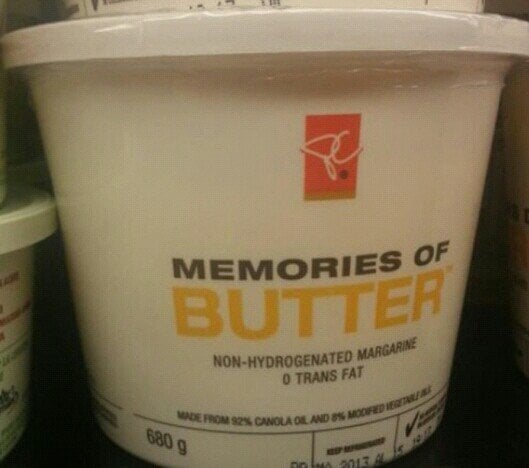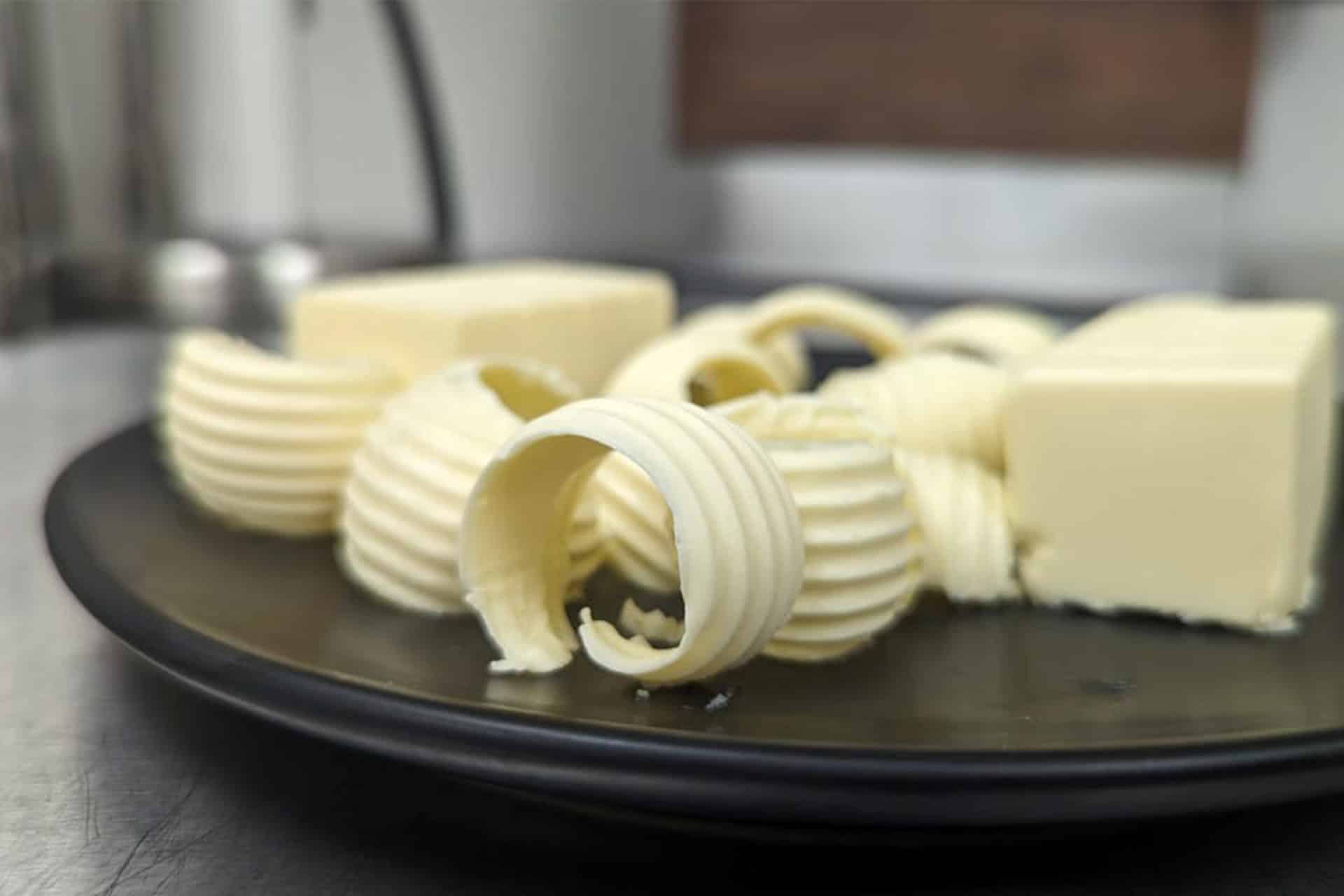A California-based startup called Savor has figured out a unique way to make a butter alternative that doesn’t involve livestock, plants, or even displacing land. Their butter is produced from synthetic fat made using carbon dioxide and hydrogen, and the best part is —- it tastes just like regular butter.
My thought was “I doubt you can make fat only with hydrogen and carbon”, but fats/lipids are literally hydrocarbons. Adding other elements changes the taste, so it isn’t necessary to have mammals anywhere in the production chain.
Very interesting and probably not the first time this is/has been done. It seems quite obvious.
It’s quite obvious at a theoretical level but not easy in terms of figuring out the actual process. A lot of science like that.
According to the savor team, it was quite easy for them:
“We start with a source of carbon, like carbon dioxide, and use a little bit of heat and hydrogen to form chains which are then blended with oxygen from air to make the fats & oils"
I want to guess they are glossing over a complicated enzyme they created, or other form of reagent.
Yeah, they’re definitely glossing over a lot of things. They don’t even mention the source of co2 or even a real timeline.
That’s like saying you can build a nuclear bomb by smashing pieces of uranium together. Technically true, but it’s a lot more complicated than that.
Adding other elements changes the taste,
This is not how chemistry works at all.
To start with, fatty acids also need Oxygen because of the COOH and OH group of the glycerin in fat. They are not hydrocarbons. You know what also is just made of Carbon, Oxygen and Hydrogen? Hundreds of thousands of molecules. All sugars and carbohydrates. If you allow for Nitrogen too, you could cover most molecules found in biological life.
None of this has any bearing on how difficult or complicated it is to synthesize these from more basic molecules like CO2 or H2.
deleted by creator
Hopefully by producing a potentially profitable product, they’ll secure the funding to drive some carbon capture systems as well.
Something I wondered with this, is that butter/margarine/similar need an emulsifier. They consist of basically 80% fat + 20% water, which would not normally mix, but then you add an emulsifier and they do.
There’s lots of different emulsifiers. In butter, it’s apparently mostly casein. My margarine lists lecithin and glyceride.
And well, looks like glyceride consists out of lots of H, C and O, so I’m guessing that’s probably what they’re using in this process…
the best part is —- it tastes just like regular butter.
Yeah, never heard that one before. Weird how every non-whatever replacement foodstuff tastes just like the original… literally 0% of the time.
Butter is one of the few that I legitimately can’t tell the difference between the real thing and the vegan alternatives (some of them).
Cheese is the opposite. Not only have a never had a vegan cheese that tasted like real cheese, I’ve never had a vegan cheese that tasted good.
I want that vegan blue cheese that won the competition and then got disqualified by dairy industry corruption
Have you tried good proper butter? Not that weird white stuff Americans make. Actual flavourful yellow Irish butter.
Margarine tastes okay and I use it all the time, but it’s a pale imitation of the real thing.
Yeah, being from the northern part of Spain I have tasted plenty French butters, I still prefer margarine. Taste is subjective so it’s better not to have prejudices about food since those prejudices might be from someone with different taste buds.
French butter like Prèsident is so good, better than Irish butter in my opinion.
And that’s considered one of the fairly inferior choices.
Oh no doubt, I saw it in Walmart though so it was easy to try
Yeah, I have. If you put that and a good vegan butter substitute on toast back to back, I might be able to tell the difference, but if you put them in a dish, I definitely wouldn’t. Yeah, margarine isn’t very good. There are much better substitutes than margarine.
I want to try non dairy cheeses but they’re all so so bad it makes me sad. And super expensive for being bad!
Ever since I’ve had to go dairy-free due to sudden lactose intolerance, I’ve had to learn the sad world of vegan cheese. And, the thing that I’ve learned is that almost all the makers have this obsession with coconut oil, the smallest amount of which I can taste—giving the cheese an “off” taste—and which gives me heartburn.
You should be able to eat cheese that has been matured for 6 months or more for example cheddar, just make sure it actually is matured for that long, cheddar can be sold as 3 to 24 month. I am assuming it is 3 if nothing is specified, younger cheddar is sweeter so I wouldn’t be surprised if most cheddar in your store is that young like those hamburger slices. Everyone except me in the family has lactose intolerance and are very sensitive but can all eat 6+ months matured cheese. Which is great because that was the only kind of cheese we all liked anyways.
lactose sensitivity can be different from person to person so maybe you can eat a younger cheese. Cheese that had a low lactose from the start could be enough for you or just a few weeks maturing. 6 months is just something that has always worked for us without the need to know how much lactose there are.
Appreciate your taking the time to respond. Unfortunately, while I know all this, it doesn’t quite line up with my experience. I’ve seen the difference between an aged cheese like 3-year cheddar and American. But, there’s still a reaction to the cheddar, even if slight. (And, yes, I’ve had the allergy tests…)
So, I’ve found it safest to go with vegan cheese, particularly when the cheese I really want is American (or, at least Gruyère). Unfortunately, I never could get into breakfast sandwiches or burgers with cheddar—the stuff just breaks too easily.
That is too bad :( I am also not a fan of the taste of vegan substitute. I love cheese so I really hoped the info could help you. American cheese does not follow the same strict regulations as European (very traditional) so that could be even more tricky. I really hope you will find a substitute that can at least taste good.
deleted by creator
They make pills that you can take that have the enzyme to digest lactose for you. If you eat one before dairy, you shouldn’t have any ill effects.
Appreciate your taking the time to respond. Unfortunately, I’ve got plenty of those, and they’re sadly not a silver bullet… 😞
Un-Brie-lievable is one of the only great vegan cheeses I’ve had (expensive as hell though)
The problem is a lot of store bought vegan cheeses are ok at best. I think violife is probably the best i have been able i buy but it’s still not great.
But, making vegan cheese yourself otoh you can make some really good shit.
Cathedral city has a delicious mature cheddar, but otherwise yes I tend to also avoid most vegan cheeses simply because they taste crap. Even if they taste okay, they lack the faintest bit of nutrition; dairy cheese at least has some protein and calcium, but vegan cheeses are usually just fat and salt with nothing of value.
Same. I have dated a few vegans and it’s always the cheese that holds me back.
I don’t know about international food, but the German vegan meat companies like Rügenwalder Mühle and Like meat have made huge leaps last year. Mortadella, Fleischwurst, Schnitzel and Chicken Nuggets all taste almost identical to the original. Ground “meat” is close, but you have to chose the right kind for each recipe. More complex stuff is still really bad tho. I say all of this as a passionate vegan meat hater.
Vegan butter has tasted very good, both with their own tastes but also others tasting just like “normal” butter for years now.
I ate margarine since forever, way before veganism was a thing. It’s just a product that was cheaper than butter and it tasted good.
Quote Randy Marsh from South Park, while tasting the impossible burger… “Wow this sucks. People actually eat this?”
They’re not bad, on par or better than most frozen grocery store hamburger patties, and way better than the vast majority of fast food burger meat. No, they’re not better than a hand ground 80% lean sirloin patty, but they could easily replace what McDonald’s uses without their customers batting an eye.
I’m disappointed that Impossible Burger is the one available at most restaurants, because the Beyond Burger tastes way better imo.
There are some decent replacements, I was amazed by the vegan foie from hello plan foods. Almost all the taste without the horrible feeling of guilt.
https://www.helloplantfoods.com/_foie-gras-plant-based/
For foie specifically, it’s worth to try to find alternatives due to the creation process of the original being so bad that it’s basically banned outside of Spain and France.
Yeah I’m a meat eater and I wouldn’t touch foie gras. Fucking horrible
Sounds like margarine with more chances to shit myself
Margarine is made of hydrogenated oil. This is chemically identical to the fatty acids in butter. It’s not an alternative for dietary purposes, it’s just a more planet friendly solution.
actual margarine is getting hard to find in stores around here, and when you do it’s priced almost as high as a non-sale price of real butter. margarine has 80% fat content and similar baking and cooking properties as butter.
what’s on store shelves is a cheapened, watered down product laced with extra chemicals and fillers, ranging from 25-40% oil and can’t even make a proper box of mac & cheese. some of them don’t even melt when put on toast, hot, right from the toaster.
I see you didn’t read the article
Basic internet etiquette. Never read the article. Disagree with everyone. You are always right. Everyone else is always wrong etc.
You are absolutely wrong.
I think it’s closer to the coal butter synthesis but maybe they found a more efficient method using other carbon sources
Carbo-LEO.
“You see, we take all that bad stuff we learned from Oleo pantshitting technology, and then we move it around. Now we have ‘Carbo-LEO’'.”
Found the guy who failed high school chemistry.
Interesting way to get fat alternatives, people are already used to eating fake butter regularly, so it probably wouldn’t take much to add this to our diet.
It’s also closer to butter than butter alternatives. It’s not made to be more healthy, just more planet friendly.
Fat and oil production from animal and plant-based sources are collectively responsible for about 3.5 billion tons of CO2
You cannot be serious that animal-based and plant-based are grouped in this figure. Plant-based is likely close to carbon-neutral, and only not net-negative, because of transport, cooling etc., which will also be necessary for this artificially created fat…
Tilling, seeding, treating, and harvesting all require machinery and therefore increase carbon output in farming.
Yeah. But since farm animals are often fed from farmed plants these days, animal-based tends to be worse by quite a solid factor. This article puts butter at 4x worse than margarine, for example: https://www.forkranger.com/blog/is-margarine-a-sustainable-alternative-for-butter/
How plant-based compares to this new process still needs to be seen for sure. If it’s just a machine you can plug in at the store and everyone can get their butter like out of an ice cream machine, without transport and cooling chain, then it’s likely a lot better.
But at this point, I don’t expect the process to be much more efficient than what plants are doing, which means you’d still need a ton of energy and particularly also land area for it.Your comment existing has a carbon footprint, doesn’t mean it should be paired with the dairy industry’s
Plus the simple effects of land conversion. Plus the emissions from the feces.
Well you see, animal sources are responsible for 3.7 billion tons and plant sources are responsible for -0.2 billion tons.
I thought that was funny.
The biggest question which is barely alluded to in the article is cost. If it can’t compete with mass produced butter at cost and scale then it’ll just be another “alternative” which is good but not as big.
They also mention that they compared emissions and land use but give no aspect of what synthetic processes are used (I’d assume they at least have provisional patents on the “how to” already).
Take all the subsidies out of the dairy industry and see how competitively priced butter actually is.
Could be subsidized as a “real” carbon offset. That could make it competitive with other butters. Assuming it’s actually legit.
It wouldn’t offset much, given the upper price for direct air capture here https://www.iea.org/commentaries/is-carbon-capture-too-expensive at a little under $350/ton, and assuming a pound of ‘butter’ comes entirely from CO2 (some will by hydrogen based on the article, but assuming that’s negligible) that means at most the credit should be 16¢ per pound, which is 3.4% of the average cost of a pound of butter ($4.69, https://fred.stlouisfed.org/series/APU0000FS1101). My cost of butter is below average and it’s still only a 4.5% subsidy.
Edit to add: if you count the CO2 production from obtaining the milk used for real butter against the cost as well (let’s assume the resources for this process and the process of making milk into butter are similar), it seems like producing a pound of butter is emits around 4 kg of CO2, which nets you another $1.4 on each package of butter (if you use the lower number for carbon capture this is a total of $0.6 including the pound of capture from above). This is actually pretty significant, so if there was a tax for greenhouse gas emissions to cover the cost of recapture it would help a product like this be more viable.
“The big challenge is to drive down the price so that products like Savor’s become affordable to the masses—either the same cost as animal fats or less. Savor has a good chance of success here, because the key steps of their fat-production process already work in other industries,” Gates said.
Sounds like it’s not currently price competitive but it might be in the future. I expect economies of scale would be helpful too.
As if dairy fat isn’t subsidised already.
And? Whether it’s fair or not that is their competition.
With Gates, you know it’s going to be priced to be competitive and disruptive to the market.
Yeah, that’s always the thing with these technological solutions, you practically cannot compete with plants. They involve barely any work, nor machinery, for the output they deliver.
deleted by creator

What on earth is that picture?
Canadian brand (President’s Choice) that apparently has a “memories of” product line.
During WW2, due to the food shortage, Germans did this using the carbon from coal… The process is old and known.
https://en.m.wikipedia.org/wiki/Margarine#Coal_butter
Let’s see if the process can be made more efficient this time. Allegedly, the product was virtually indistinguishable from butter.
Allegedly, the product was virtually indistinguishable from butter.
Well it says
Margarine made from them was found to be nutritious and of agreeable taste
Doesn’t sound indistinguishable to me.
It is just regular margarine, and for me, it is inedible. Tastes like vaseline.
Computer! Butter! Room temp!

If this were to take off France and the US South by themselves could eat us out of climate change in a matter of months
Don’t want to be a hater but doesn’t this basically create fat without nutrients? It feels like this is reinventing margarine albeit in a cool way.
They’re the same fatty acids found in butter. Margarine is hydrogenated oil.
They’re from the same class yes, but is it also going to contain vitamins A, D, E and K2 or contain fatty acids like Conjugated Linoleic Acid or Butyric acid?
I’m trying to point out that factory produced fats will most likely lose out on the health benefits of butter as a source of fatty acids.
well fat is inherently a nutrient so, no.

Is it as bad for your health as hydrogenated oils?
Even if it is – I’m interested in seeing how it performs. Feed some rats 3-5x the recommended amount, see what happens. Have some long term studies.
If it is the same as what we use, right now, for a lessened cost or environmental impact, that is still worth exploring.
Guarantee that A) it doesn’t taste just like real butter, and B) it’ll make you shit yourself and bring a return of the label “may cause anal leakage”.
Does that mean it’s not a potentially viable product? No, it doesn’t. But let’s not bullshit.
The problem with Olestra (the anal leakage oil alternative) is it’s a mixture of hexa-, hepta-, and octa-esters of sucrose with various long chain fatty acids. The resulting radial arrangement is too large and irregular to move through the intestinal wall and be absorbed into the bloodstream.
What Savor has supposedly created is chemically identical to the fatty acids in butter. It’s not made of new compounds, but made in a new way.
What’s up with people talking about shitting themselves?
We’re in the presence of masters of the art of shitting one’s self
There was a run of fat replacement back (iirc) in the late nineties. Olestra was one of the name brands.
It wouldn’t digest at all, and it also wouldn’t mix in happily with the rest of the body waste in the colon. Hence, anal leakage becoming a phrase you would see on food labels.
And you would, sometimes, have not only leakage, but diarrhea. Sometimes violent diarrhea.
Basically, the oil was slippery enough to escape the anus no matter how tight it was. And there was a lot of it, under pressure from other waste behind it.
Thank you for that insight. Kind of hilarious they didn’t figure that out during product testing.
I wonder if they can use CO2 that comes from industrial carbon capture, or if it needs to be something purer that takes a lot of energy to produce.
Also, I’m not sure if we can get industrial volumes of hydrogen from sources other than fossil fuels now. Its been a while, but last I checked it was coming from things like byproducts from reformers.
It would need to be food grade CO2. So breweries would be a good source.






















